
Now that the orgy of insufferable hipsterism known as Coachella is finally behind us, it’s officially music-festival season, when hundreds of concerts will take over entire cities, towns, parks, and fields across the United States. As everyone knows, events like Lollapalooza, Lockn’, and Bonnaroo follow in the grand tradition of the Woodstock Music & Art Fair held in August of 1969. That’s when a dairy farmer from Bethel, New York, named Max Yasgur opened his pastures to half a million unwashed flower children and hippie-wannabes.
“The Piano Drop definitely started Woodstock. In our own minds, of course.”
Actually, Woodstock was not the first outdoor festival to feature multiple bands over several days performing on a stage set up out in the middle of a farmer’s field. In fact, the organizers of Woodstock may well have taken their cue from the Sky River Rock Festival and Lighter Than Air Fair, held over Labor Day weekend of 1968, a full year earlier. At Sky (short for Skykomish) River, some 20,000 people descended on Betty Nelson’s organic raspberry farm in Sultan, Washington, to turn on, frolic naked in the mud, and tune into the music of 20 or so bands and performers, playing everything from folk and blues to jazz and rock. A young Richard Pryor was there (his debut comedy album would be released that November), as was the Grateful Dead, whose unscheduled appearance on the last day of the festival was as big a surprise to the concert’s exhausted and bewildered promoters as it was to the appreciative crowd.

Top: This photo of Joe McDonald, shot by “Helix” editor Paul Dorpat at Sea-Tac International Airport, was used to advertise a weekend of shows, including the Piano Drop, by Country Joe and the Fish. Above: An ad for two benefit events (including the Piano Drop) for the “Helix” and radio station KRAB.
Whether Woodstock would have happened without Sky River is, of course, anybody’s guess, but Sky River absolutely would not have happened without an even less-heralded event called the Piano Drop, a one-day Dadaist spectacle held on April 28, 1968, in a tiny town (its population was just 455) northeast of Seattle called Duvall. As the name of the event suggests, the Piano Drop featured a dropped piano (which organizers hoped would land on a specially prepared wood pile with a resounding crash), plus music by Country Joe and the Fish. Depending on whom you talk to, at least 3,000 and as many as 5,000 people showed up for this experiment in sonic mayhem.
“It was, like, a happening, you know?” says Joe McDonald today. “We didn’t do a lot of artsy happening things,” he adds, “but I was personally open to all sorts of crazy kinds of ideas, so I wouldn’t have objected to that.”
The impetus for this particular crazy idea is a matter of low-key debate among Piano Drop historians and those who were there. The “official” history of the Piano Drop, as chronicled by the late writer, artist, and political activist Walt Crowley in “Rites of Passage: A Memoir of the Sixties in Seattle,” credits artists and musicians Gary Eagle and Larry Van Over (aka Jug, for the jug band he played in) for the idea. Everyone agrees on that, but exactly what inspired them is tougher to pin down. According to Crowley, Van Over and Eagle were listening to a radio show one night when the station aired a recording of 200 “revelers” dismantling/destroying a piano with sledge hammers. Apparently, wrote Crowley, the two friends were disappointed with the “aural experience” and thought they could do better.
That may be true, but today, almost half a century later, Gary Eagle says it was only part of the story. “Well,” he begins, “it was a few things. We were hauling a piano through the Central District of Seattle one time and it fell off the truck. We thought that it sounded kind of cool when it hit the pavement. So we were playing the piano one night, trying to figure out how to replicate all the noises. We were pretty loaded, but we decided that if we dropped it, it would make this huge boom, and that would really be cool. So we went around Seattle trying to find a hall that would let us drop a piano in it. But they wouldn’t do it, especially when it was a bunch of crazy hippies asking. So we decided, hell, Larry has this piece of property out in Duvall, we’ll just do it there.”
“I had purchased a three-acre piece of property in Duvall,” confirms Van Over, “where I was building a house for myself, just to see if I could do it, you know? That became the site for the Piano Drop.”

Piano Drop tickets were designed by Larry Van Over.
At the time, Eagle was working for an alternative newspaper called the “Helix,” whose editorial DNA revolved around civil rights, ending the war in Vietnam, sex, drugs, and rock ’n’ roll. In his capacity as the paper’s editor and publisher, Paul Dorpat actually found himself involved in that last arena quite a bit, promoting local bands like Magic Fern and national acts like Country Joe and the Fish at Seattle’s Eagles Auditorium. When Dorpat heard about Larry Van Over and Gary Eagle’s planned Piano Drop, he knew right away it was something “Helix” readers would get behind.
“We embraced it very early,” Dorpat recalls, “and then at some point I got ED Denson to go along with making Country Joe and the Fish the musical draw.”
“ED was our manager,” explains McDonald, “and I guess he talked to Paul. I just sort of went wherever the band went and did whatever was supposed to be done.”
As luck would have it, the “Helix” already had a benefit scheduled for itself and alternative FM radio station KRAB (the station that had aired the piano-and-sledge-hammer concerto) for the weekend of April 21. In no time, the benefit was repositioned as the first of two fundraisers—a ticket stub from the April 21 event got you into the Piano Drop for free, otherwise the latter would cost you a buck. Country Joe and the Fish were already booked into Eagles Auditorium on Friday, April 26, and Saturday, April 27, so for them, playing the Piano Drop only meant hanging around in the Seattle area for one extra day, which was anything but a hardship. “We had a lot of fun up there,” says McDonald of Seattle in the late 1960s. “It was another hippie Mecca.” The stars, as they say, had aligned for the quixotic spectacle that Van Over and Eagle figured might draw 300 kindred weirdoes.

Country Joe and the Fish playing at the Piano Drop. Note the equipment truck parked behind them.
Having the “Helix” in his camp gave Van Over the modest amount of seed money he’d need to purchase a used piano ($25) and rent a helicopter (that cost another $100). Details are sketchy, but by that morning, people were starting to stream in by the thousands, clogging narrow Cherry Valley Road for miles leading to what became known as Jug’s Ravine. Fortunately, Country Joe and the Fish had arrived early (“I remember being there, but I don’t remember driving there,” says McDonald), which allowed them to set up their amplifiers and instruments on the makeshift stage that had been set up steps from the rear end of the band’s equipment truck. Sometime around 1 p.m., the Fish began their set.
Meanwhile, Van Over decided it would be a good time to drop a hit of acid, since all he had to do that day was pay the helicopter pilot at Boeing Field the hundred bucks he had brought along for this solemn purpose, and then hop into the chopper’s cockpit for the 20-miles-as-the-crow-flies flight back to Duvall.
“It was kind of a wild ride—I was pretty disconnected,” Van Over allows. “And by the time we got out there, there were 3,000 people underneath us, which made the pilot very nervous. He hadn’t expected that. He said, ‘I can’t fly over these people with a piano,’ and I said, ‘Why?’ And he said, ‘Because it’s dangerous!’ And I said, ‘They’ll part like the Red Sea the minute you come over the hill with that piano hanging underneath you.’ I got out, he hooked up the piano, and when he picked it up and started flying over the crowd, they just split, like in the movies. It was really a wonderful scene.”

Paul Dorpat’s article in the “Helix” after the Piano Drop (click to enlarge). The photo at lower-left shows the crowd from the stage. The photo at center-right shows the helicopter with the piano dangling below.
“If that’s true, then I was the hand of God,” says Dorpat, who was the day’s emcee. Until the arrival of the helicopter, Dorpat’s duties had been to introduce Country Joe and the Fish and then step to the side of the stage and enjoy the music. Once the helicopter appeared, though, he was the guy whose job it was to keep innocents out of harm’s way.
“I tell you, it was damn frightening,” he says, “because it was my responsibility to move people away from the wood pile, which was considered an appropriate target for dropping a 500-pound piano on, if you ever plan to do that. Because the pile was all pieces of wood, if the piano hit it squarely it would make a wonderful crashing sound—and scatter all the pieces into the audience.” The pilot, it seems, was not the only one with a slight case of the nerves.
By now, around 3 p.m., Country Joe and the Fish had stopped playing, and most people agree on what happened next. “I remember a helicopter coming overhead with a piano underneath it,” McDonald says. “It was kind of swaying back and forth. I thought to myself, ‘It’s time to drop that thing and go home.’”

The piano, post-drop.
“He tried to stop directly above the log pile,” says Van Over, “but the piano just kept dragging him.” “When the helicopter was up there,” Dorpat confirms, “and the piano started to sway, the helicopter started to sway, too. And they sort of swayed below and above one another—you didn’t know which one was in control. At one point a little piece of paper fluttered down (I’m not sure what that was about), and then the thing was let go.”
According to Crowley’s “Rites of Passage,” the swaying of the helicopter and the piano below it caused the pilot to panic. He “hit the harness release, but nothing happened. He then hit the emergency cable release, and the piano snapped free.” In his poetic telling of what happened next, Crowley describes the piano making a “lazy arc through the bright spring sky.” But Dorpat recalls a different set of sensations. “When I saw that thing fall, my heart went from my chest straight into my head, just like that,” he says. “The cliché of being caught by surprise, of having your heart go up into your throat, was exactly how it felt. And I thought, ‘My God, I hope it doesn’t hit anybody,’ because I had just spent 20 minutes trying to get people to move back and make a larger, safer area around the target.” Which the piano spectacularly missed.

In the 1990s, Paul Dorpat gave Joe McDonald (above) a copy of a poster designed by Paul Heald and made to promote the Piano Drop.
“After the pilot dropped the piano,” says McDonald, “it landed in a grassy area without hardly making a sound.” By now, the helicopter was long gone. And then, as McDonald and everyone else remember it, “people rushed down to the piano and started tearing it apart to get souvenirs. Pianos are pretty well put together. I remember thinking that it would be hard to tear a piano apart with your bare hands, but that’s what they were doing. It’s hard to completely destroy a piano by dropping it,” McDonald adds, “unless you drop it from a couple of thousand feet. But then it might land on somebody. But I don’t know—that sounds pretty dangerous.”
In the end, the piano dropped uneventfully and safely, while the event itself and lure of Country Joe and the Fish raised $875 each for “Helix” and KRAB, which is not too shabby when you remember that the event’s organizers were only expecting 300 people to show up. But the bigger impact was the almost immediate planning that began on Sky River. “If we could get 5,000 people for one band, how many could we get for 20?” asks Van Over today, echoing the question that was on everyone’s mind. “So the Piano Drop was the prototype for the Sky River Rock Festival, although it certainly didn’t start out that way.”

Though the piano’s sounding board was hauled away by souvenir hunters within minutes of hitting the ground, it is now being stored by Paul Dorpat.
“It’s amazing that we did a festival as ambitious as Sky River that fall,” agrees Dorpat. “The Piano Drop was very much the trigger, proving that it would be possible to do an outdoor concert, and perhaps a multi-day concert, with more than one band.”
“We had no idea what we were doing,” admits Gary Eagle, who along with Van Over helped build the Sky River stage that Santana, the Grateful Dead, Muddy Waters, and Big Mama Thornton would perform on four short months later, “but it came off great and everybody had a good time.”
“Some people think Sky River gave birth to all that stuff back east,” muses Van Over, “so we’re saying the Piano Drop definitely started Woodstock. In our own minds, of course.”
(Special thanks to Scott McDougall.)

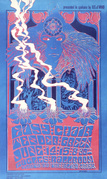
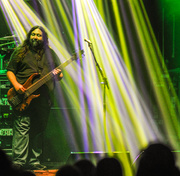 Good, Clean Fun: This Rock Star Parties Hard (with Hot Wheels and Wacky Packs)
Good, Clean Fun: This Rock Star Parties Hard (with Hot Wheels and Wacky Packs)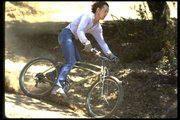
 Rainy Day Psychedelia: Seattle’s 1960s Poster Scene Gets Its Day in the Sun
Rainy Day Psychedelia: Seattle’s 1960s Poster Scene Gets Its Day in the Sun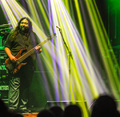 Good, Clean Fun: This Rock Star Parties Hard (with Hot Wheels and Wacky Packs)
Good, Clean Fun: This Rock Star Parties Hard (with Hot Wheels and Wacky Packs) The Hippie Daredevils Who Were Just Crazy Enough to Invent Mountain Biking
The Hippie Daredevils Who Were Just Crazy Enough to Invent Mountain Biking PianosThe piano was invented in the early years of the 18th century by an Italian…
PianosThe piano was invented in the early years of the 18th century by an Italian… MusicIn so many ways, music is the soundtrack of our lives—whether we're driving…
MusicIn so many ways, music is the soundtrack of our lives—whether we're driving…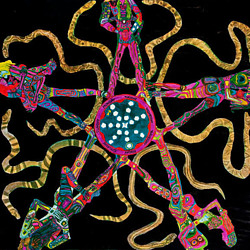 Mari Tepper: Laying it on the Line
Mari Tepper: Laying it on the Line Nice Ice: Valerie Hammond on the Genteel Charm of Vintage Canadian Costume Jewelry
Nice Ice: Valerie Hammond on the Genteel Charm of Vintage Canadian Costume Jewelry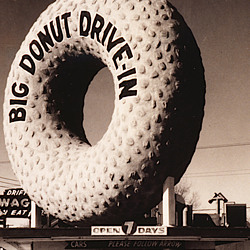 How Jim Heimann Got Crazy for California Architecture
How Jim Heimann Got Crazy for California Architecture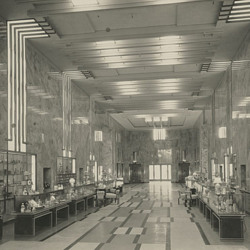 Modernist Man: Jock Peters May Be the Most Influential Architect You've Never Heard Of
Modernist Man: Jock Peters May Be the Most Influential Architect You've Never Heard Of Meet Cute: Were Kokeshi Dolls the Models for Hello Kitty, Pokemon, and Be@rbrick?
Meet Cute: Were Kokeshi Dolls the Models for Hello Kitty, Pokemon, and Be@rbrick?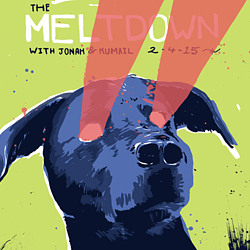 When the King of Comedy Posters Set His Surreal Sights on the World of Rock 'n' Roll
When the King of Comedy Posters Set His Surreal Sights on the World of Rock 'n' Roll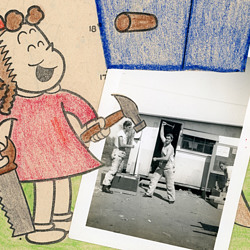 How One Artist Makes New Art From Old Coloring Books and Found Photos
How One Artist Makes New Art From Old Coloring Books and Found Photos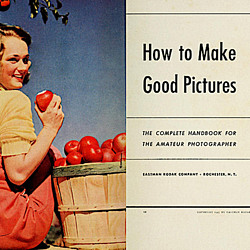 Say Cheese! How Bad Photography Has Changed Our Definition of Good Pictures
Say Cheese! How Bad Photography Has Changed Our Definition of Good Pictures Middle Earthenware: One Family's Quest to Reclaim Its Place in British Pottery History
Middle Earthenware: One Family's Quest to Reclaim Its Place in British Pottery History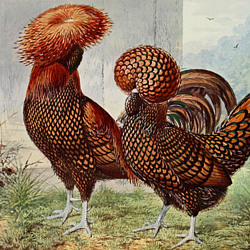 Fancy Fowl: How an Evil Sea Captain and a Beloved Queen Made the World Crave KFC
Fancy Fowl: How an Evil Sea Captain and a Beloved Queen Made the World Crave KFC
No mention of Monterey Pop… Because it wasn’t in a farmers field?
Sorry, but the first multi-day rock festival, and the one on which both Sky River and Woodstock were based, was the even earlier Monterey Pop Festival of 1967. It ran from June 16 through 18 and featured most of the greats of the day. While it didn’t boast a piano drop, it did plant the seed for all future rock festivals.
Haha Wish I could have been there! Great story.
The writer didn’t say Sky River was the first rock festival … he said that Woodstock was “not the first outdoor festival to feature multiple bands over several days performing on a stage set up out in the middle of a farmer’s field. ” On that score, it’s a pretty convincing precedent.
I remember the 60s Happenings. They were fun for a little kid, born in 1959. One of them on Long Island filled a new pit created for a landfill dump with foam bubbles. Then the participants frolicked in the foam.
Monterey Pop wasn’t the first. The Fantasy Fair and Magic Mountain Music Festival beat it, by a week.
I’m guessing there were lots of local “field jams” across the country similar to hootenannies even before 1967, but not electric and not covered by national media outlets – two important distinctions.
Monterey is distinguishable for several reasons. It organized and advertised on a more intentionally commercial scale, professionally recorded with movie and soundtrack rights in mind. It was located at a fairgrounds in an populous urban area with good road access full amenities & parking available for the intended crowd. Sky River was a far more grass roots / distinctly rural event and became more popular than foreseen with all the attendant problems that come with that; parked cars clogging miles of rural roads, a lack of amenities, the poor frog pond in the woods used for water and bathing…. all the stuff that made those brief amateur festival years the messy legends they became.
Anyone interested in the radio program alluded to in the article might want to check this out in the KRAB archive: http://www.krab.fm/KRAB-Helix-Piano-Drop.html
I was there. I had a key, long ago. Piano key, that is. Not as orgasmic an event as I’d expected, but still a nice flump.
Great little festival, weed and whatever there. Stoned there like everywhere else in Seattle, Sam’s Red Robin before Gerry bought it and of course the Blue Moon. And now age takes its toll, no more weed and no more booze but the memories linger on. And yes, the piano did make a thud when it landed, a very quiet thud if I remember correctly . . . and life goes on.
A Very entertaining tale here! Seattle has been a hot bed through the years, from Hendrix to Nirvana. A great article to begin the 50th. anniversary of Woodstock!
Soon, it will be the anniversary of the Stones concert, famous and infamous, at the Altamont Speedway.
Thomas(Brunswick).
Seattle Helix throughout the article….I think I have all of those issues.
I also have what I would call a program. Titled “When the Grass Grows Over Me”, it it 20 pages of info on the festival and bios of all the bands.